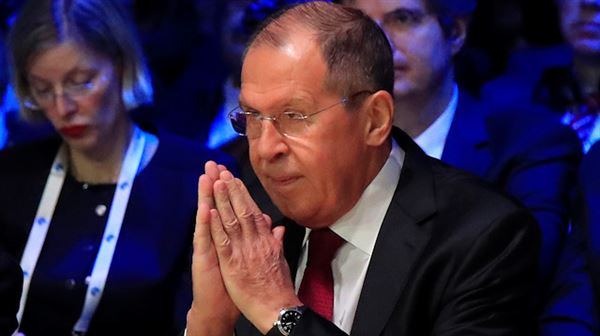Russia accused the U.S. on Tuesday of attempting to separate Syria from its oil-rich regions. Speaking at the second Paris Peace Forum in the French c
Russia accused the U.S. on Tuesday of attempting to separate Syria from its oil-rich regions.
Speaking at the second Paris Peace Forum in the French capital, Foreign Minister Sergey Lavrov alleged that Washington pushed Gulf countries to finance the creation of a quasi-state, based on the PYD and SDF terror groups, on the eastern bank of the Euphrates river.
“On the eastern bank of the Euphrates River, they [the U.S.] built quasi-state structures and asked the Gulf countries to invest heavily so they could create a local administration based on the Syrian Democratic Forces [SDF], Kurdish PYD and others with the very blunt intention to separate this part of Syria and to control the oil fields there,” Lavrov said.
In its more than 30-year terror campaign against Turkey, the PKK — listed as a terrorist organization by Turkey, the U.S. and the European Union — has been responsible for the deaths of 40,000 people, including women, children, and infants. The YPG/PYD is the PKK’s Syrian offshoot.
Underlining that Turkey’s anti-terror Operation Peace Spring in northern Syria was caused by Washington’s incapability of reaching a deal with Turkey, Lavrov said: “Then, after they left the Kurds and left Syria, they said: ‘OK, we don’t have any more obligations to the Kurds, but we are coming back for oil, not for the Kurds.'”
He added that Kurds in the region should have a place in ongoing political dialogue to end the Syrian conflict on the condition that they respect the country’ territorial integrity and refrain from any attempts at separatism.
“If they, in the beginning of the conflict, decided that they could go unilaterally with the support of the U.S. when they declared the creation of this ‘Federation of Rojava’, and they thought they would always be supported by the U.S. in this separatist movement, this was their decision.
“We were trying to explain to them and to the government that it is important to initiate dialogue between the Damascus authorities and the Kurds. The Kurds were not interested, they believed that they would be always covered by the U.S.
“When the U.S. made this move [to withdraw from the Turkey-Syria border], the Kurds started asking for our help to start a dialogue with the government, which we were ready to do. But when the Americans said ‘we are coming back to control the oil fields’, they again lost interest in this dialogue. So we need some consistency,” Lavrov said.
The minister added that the Syrian crisis could only be resolved if the interests of the Kurds and all other ethnic and confessional groups were taken into account.
He stressed that the Kurds are represented in the Syrian constitutional committee in Geneva, but not the PYD.
Asserting that conflict in the region — including that between Turkey and the PKK/PYD — required “very thorough discussion and a solution which would be strictly political”, Lavrov underlined that this dialogue must be with “all the key players sitting at the same table and thinking in terms of respecting the territorial integrity of Syria and resolving all national ethnic and confessional issues within the territorial integrity of Syria.”
“This is what the constitutional committee is about,” he added.
After ordering a withdrawal of U.S. forces from northern Syria last month around the time Turkey launched its anti-terror Operation Peace Spring in the region, U.S. President Donald Trump backpedaled, saying U.S. troops would stay in the region “to secure the oil.”
“We have taken it and secured” the oil, he said, suggesting “a deal with an ExxonMobil or one of our great companies to go in there and do it properly.”
Without mentioning the U.S., Turkish officials have said that while freeing locals from terrorist oppression is a legitimate reason for having troops in Syria, taking oil is not.
Turkey on Oct. 9 launched Operation Peace Spring to eliminate YPG/PKK terrorists from northern Syria east of the Euphrates River in order to secure Turkey’s borders, aid in the safe return of Syrian refugees, and ensure Syria’s territorial integrity.
On Oct. 22, Turkey reached an agreement with Russia to force YPG/PKK terrorists to withdraw from the planned terror-free zone with their weapons.
